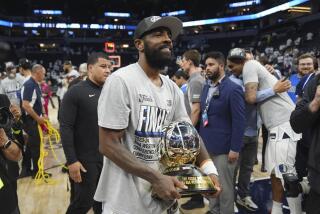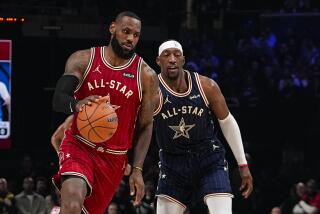MVP : Malone, the Standout Jazz Forward Known as Mailman, Edges Jordan in the Voting to Earn Stamp of Greatness
- Share via
The candidacy moved from interesting concept to live possibility to state-wide Utah obsession to, finally and forcefully, Sunday’s extra-Jordan-ary official announcement.
Three letters, one man: Karl Malone, MVP at age 33.
It’s a graduation of sorts for the 12-year veteran Jazz power forward--up among the league’s legends--and the valedictorian himself gave a wink and a smile to the man he edged, four-time winner Michael Jordan.
“I thank Michael for letting me borrow it for one year,” Malone joked at a Salt Lake City news conference Sunday after edging Jordan by 29 points, the second-closest voting for the NBA’s most-valuable-player award since media balloting began in 1981.
Only the 1990 balloting, when Magic Johnson received 22 more points than Charles Barkley, was tighter.
And, to add sweet significance in this sports atmosphere of instant gratification and one-dimensional, 19-year-old prodigies, Malone is the oldest player to win the award in its 41-year history.
“To have this trophy after 12 years, really and truly I never thought I’d have the opportunity,” said Malone, who led the Jazz to a team-record 64 regular-season victories and playoff series victories over the Clippers and Lakers.
“The one year I’ve had the most fun I’ve ever had . . . all of a sudden I win the award.”
The Western Conference finals will begin tonight against the Houston Rockets at the Delta Center, and it’s off to battle once again.
But, with the pomp and circumstance that came with a chorus of endorsements from the likes of Shaquille O’Neal and Charles Barkley, as the MVP seemed more and more a fait accompli the past few weeks, Malone began to talk about the voting as a touchstone of his career--a goal he never fully recognized until now.
“Look and see where Karl Malone came from, where he started, a 48% free-throw shooter when he came in the league [he made 75.5% this season], his body is not the same as it was when he came into the league, his passing’s not the same as it was when he came into the league,” Jazz Coach Jerry Sloan said recently.
“He’s probably improved as much as anybody could from where he started out. A lot of guys come in as stars to begin with. He was not a star, but he put himself in position, through a lot of hard work, to become a better player.”
Though his statistics once again were formidable (a 27.4 scoring average, second only to Jordan; 9.9 rebounding average; 55% field-goal shooting), Malone has at times scored more and rebounded better during 11 previous seasons than he did in this one.
But, in a league crammed with coddled teenage millionaires who skip practices and casually opt out of handfuls of games, Malone’s durability (he has missed only four games in his career), determination to broaden his talents (he had a career-high 4.4 assists per game) and wonderful partnership with fellow future Hall of Famer John Stockton has become increasingly noticed--and treasured.
Can you imagine Allen Iverson plugging away for 12 quiet years in Salt Lake City, game after game, improving and re-proving every season? Chris Webber patiently waiting his turn? Elden Campbell leading his team in scoring 71 out of 82 contests? Shawn Kemp playing in 467 consecutive games?
Add Malone’s 31-point average leading the Jazz to a 14-1 record in March that clinched home-court advantage through the Western Conference playoffs, and there’s your throwback first-time MVP.
“No doubt I feel good about it,” Malone said of his surging season. “Little kid from Summerfield, La., wasn’t supposed to have an impact on the league.
“It’s unbelievable. It wasn’t rosy for me every year or every day of my life. It took a lot of work.”
Malone was never skinny, but he did not arrive in this league weighing his current 256 pounds, or shooting nearly as confidently as he does now. He was the country kid from Louisiana Tech who seemed to view the world at large with suspicious eyes.
This is an MVP award earned by furious work in the weight room and the basketball court (as displayed once again by his playoff-record 18-for- 18 free-throw performance in Game 4 against the Lakers, on his way to 42 points).
Though Jordan, too, is a roaring role model, implicitly, the Malone campaign, if you listen carefully enough, is about rewarding a winning work ethic that seems to be fading fast.
Malone himself broached the subject when he ridiculed the NBA for naming Iverson player of the week after Iverson scored a series of 40-point performances amid a torrent of losses.
“We’ve got so many sideshows going on with other people, we spend all the time talking about things that aren’t even important to basketball,” Sloan said.
“I mean, what’s wrong with a guy getting credit for doing the best he can to try to improve himself every day? It’s very seldom talked about unless he does something crazy, and that’s what’s talked about. That’s a sad commentary on basketball when we look at it from that standpoint.”
Asked to follow up on the Iverson criticism recently, Malone demurred, saying no elaboration was necessary.
But as the Jazz attempt to make the NBA finals for the first time, every second he spends on the floor is a loud, blue-collar statement of purpose and pride.
“Karl is a very honest guy and he does speak his mind and he’s usually right on,” said Scott Layden, Utah’s vice president of basketball operations. “I mean, he usually hits subjects right square in the face, that’s why sometimes they sting and it hurts feelings.”
On the Jazz, that has naturally translated to the role of team spokesman and leader, especially since Stockton, though an on-floor general, dislikes the media spotlight.
“‘A guy like Greg Ostertag, he should turn his whole paycheck over to Karl,” Layden said, referring to the Jazz’s second-year center. “Karl’s done a really good job showing him great leadership and it’s nice to see his growth.
“It’s due to leadership and what he sees from a guy like Malone in the weight room and what he does out on the court and what he gives to the game.”
Malone says he has taken special pride in two developments this season--the consistency of his fallaway jumpshot, which has opened up the Jazz half-court offense; and his selection to the NBA all-defensive team for the first time.
This season, Malone, a 10-time all-star, moved ahead of Jerry West into 10th place on the career scoring list and joined four other players--Wilt Chamberlain, Kareem Abdul-Jabbar, Moses Malone and Elvin Hayes--who have 25,000 points and 10,000 rebounds.
Ostertag, who had a solid series against the Lakers after sleepwalking against the Clippers, says playing against Malone in practice is a daily revelation.
“He’s so much stronger than me, it’s ridiculous,” Ostertag said. “Karl takes great care of his body, he’s in great shape all the time. That’s why he’s so much better than everybody else.
“There’s not a power forward in the league whose game is equal to his. That’s not even being biased. That’s just what I see. There’s not a power forward in the league that can hang with him.
“He’s got lightning-fast hands on defense. He gets deflections all the time. He can pass the ball, runs the floor fast, and he’s strong as an ox when he gets the ball inside.”
And still, even with an MVP trophy in his den, Malone says he knows he and Stockton and the whole Jazz franchise might be judged by the titles not won instead of the consistency of their efforts; by the anger in his eyes when he sends a flying elbow after a hard rebound instead of the focus of a dozen determined seasons.
Malone also courted controversy when he questioned the safety of playing against someone with the AIDS virus, as he did during Magic Johnson’s first, aborted comeback (and dropping his concerns during Johnson’s second comeback) and when he feuded with Jazz owner Larry Miller (briefly a few years ago, after Miller screamed courtside that he wanted Malone to be taken out of a game).
But, regardless of the off-court storms, he is always in uniform, playing about 40 minutes a night.
“A lot of things are unfair, but I don’t think you spend all your life trying to change it,” Malone said. “The only thing you can do is go out and play.
“People have a perception sometimes that we’re a dirty team, that we don’t like other people. That’s our style, that’s the way we play. That’s how I’ve played for 12 years.
“People think I’m the meanest person in the world when I play the game, which maybe I am. But I also think away from the court I’m a nice guy. They think I’m this big barbarian kind of guy. But that’s fine with me. I don’t mind.”
He plays.
“That’s what I’ve always appreciated about him,” Sloan said. “Sure, we all have our faults, things don’t always go right, but regardless of circumstances, he’s always come back and played hard.
“People say, ‘He hasn’t won a championship.’ Well, how many guys can come back and play hard after they haven’t?”
(BEGIN TEXT OF INFOBOX / INFOGRAPHIC)
The Vote
The top 10 in voting for the 1997 NBA Most Valuable Player Award, with first-place votes in parentheses:
Karl Malone, Utah (63): 986
Michael Jordan, Chicago (52): 957
Grant Hill, Detroit: 376
Tim Hardaway, Miami: 238
Glen Rice, Charlotte: 134
Gary Payton, Seattle: 105
Hakeem Olajuwon, Houston: 95
Patrick Ewing, New York: 57
Anthony Mason, Charlotte: 7
Shaquille O’Neal, Lakers: 7
More to Read
Go beyond the scoreboard
Get the latest on L.A.'s teams in the daily Sports Report newsletter.
You may occasionally receive promotional content from the Los Angeles Times.










